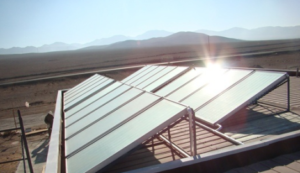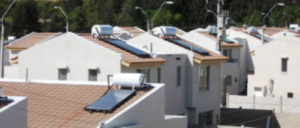Chile: So Far No Government Compromise on Extending Tax Credits
July 8, 2013
If nothing is done about it, Chilean Law 20.365 – which includes tax rebates for solar thermal systems – will end on 31 December 2013. Despite the support scheme’s success, there has not been any news on continuing the rebate policy. The main national solar associations, ACESOL and ACERA, are lobbying to extend the tax credit scheme. Although the new law is written and only needs final approval from President Miguel Juan Sebastián Piñera, there has not yet been an official date set to approve it. In a race against time, the associations are pouring their efforts into securing a compromise between the Energy Ministry, which supports the extension, and the Ministry of Finance and the Presidential Office, whose support is still to be gained.
“Chile’s solar thermal market has sunk into a great depression. Some companies may well go bankrupt in the near future, as this legal uncertainty puts a stranglehold on the market,” Christian Antunovic, President of solar energy association ACESOL, says, expressing his concerns about the prospect of the local solar thermal market.
To date, the tax rebate scheme, which was approved in 2009 and focuses on new housing projects, has been one of the most successful support mechanisms for solar thermal in Latin America. According to ACESOL, the scheme led to the installation of more than 20,000 solar thermal systems until June 2013. The association calculates with an average size of 2 m2 per system, which means that 40,000 m2 are thought to have been newly installed by housing companies profiting from tax deductions.
In early 2013, ACESOL asked the Chilean government to extend the current law until 2020 for some basic reasons: First, it took quite some time after enacting the law to implement all relevant specifications. “The delay in the original norms made the law not start to affect the market before late 2010 or early 2011,” says Antunovic. And it took another 12 to 18 months until the systems were actually built, which meant not before 2012.
This has left the country with very little time (barely 2012 and 2013) to implement the approved law. The current uncertainty has prompted several developers to ban solar water heaters from their new construction projects.
The possible end of this incentive scheme is a source of concern not only for ACESOL. The other main renewable energy association, ACERA (Chilean Association of Renewable Energy), which has more than 100 members from the industry, asked President Piñera in April 2013 to “promote and extend the current law, which has led to such growth in the solar thermal industry until now”. The official statement requested the government to “speed up the drafting of a new law that extends the tax incentives to – at least – 2020”.
Actually, the solar thermal sector had already taken the law’s extension for granted. On 23 October 2011, during the commissioning of the first solar thermal system under the current regulations, former Energy Minister Rodrigo Álvarez said that two years were not sufficient and it was necessary to extend the scheme. After almost 2 years, however, there has not yet been an official statement on how to continue.
Over the last months, the industry associations were anticipating some public announcement from the government. Moreover, it was expected that there would be some kind of statement during the presidential debate, which took place on 21 May. But the day came and no pronouncement was made: Minister Jorge Alberto Bunster remained silent on the issue. According to Antunovic, an extension has already received the approval from the Ministry of Energy and is currently in the presidential office in the last step before enactment. “The Energy Ministry was the promoter of this extension and we know that they support the new incentive scheme. But the Ministry of Finance and the Presidential Office are not with the Ministry of Energy yet. The victim of this lack of understanding is the solar thermal industry,” Antunovic points out.
If the law stays, ACESOL predicts that more than 150,000 new low-cost houses could receive solar thermal systems until 2020. The association says that, depending on the region, solar thermal systems will save between 30 to 75% of the fossil fuel costs for families. This translates into savings of up to Chilean Peso (CLP) 176,000 (around USD 345) per year and family, which represents an impressive amount in a country in which a family earns on average CLP 390,365 per month (around 770 USD).
More information:
ACESOL: http://www.acesol.cl
ACERA: http://www.acera.cl/


